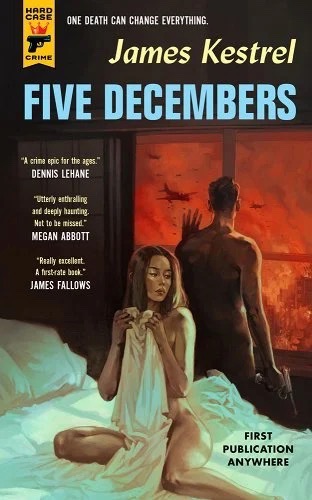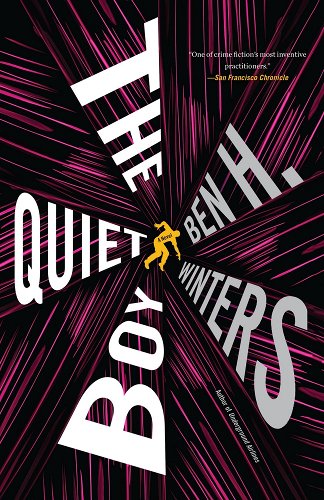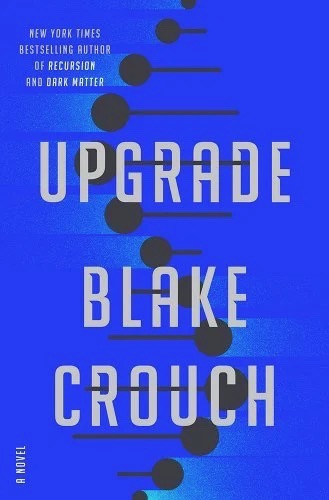Reader’s Notebook, 11/17/22

Five Decembers – James Kestrel
I cheaped out when I bought my Kindle and got the one that has “special offers,” a euphemism for constant advertising on its sleep screen. All so I could save $50 or whatever.
This book was often featured in those ads late last summer. I’ve found a lot of the books that Amazon pushes are crap, so I discounted it. Until I saw it land on a best mysteries of the year so far list. I’m glad I saw that list, because this was one of the most enjoyable books I’ve read this year.
At its core it is a pretty standard murder mystery. A couple bodies are found in a shack on a farm above Honolulu. The investigating detective then shoots and kills a man who shoots at him while he is searching the crime scene. Noir-ish escapades follow.
Ah, but what makes Kestrel’s story special is that the murder takes place Thanksgiving week, 1941. As you may know, if you’ve read your history, something big happened in Honolulu a few days later. Kestrel makes that part of the story, in a pretty amazing way.
Detective Joe McGrady thinks he has a solid lead, one that has him hopping across the Pacific in pursuit of a person of interest. He lands in Hong Kong on December 6. The next day he is captured by Japanese forces who were invading that island and sent to a prison camp back on the Japanese home islands. However, as he is being registered into the camp, a Japanese man pulls him aside with an offer of freedom. It seems that the man has a direct connection to one of those murders back in Honolulu, and wants to keep McGrady safe so he can continue his investigation when this new war between Japan and the US no doubt ends quickly.
Again, if you’ve read your history, you know that short war was not what happened. The man, and his daughter, hide McGrady until Japan surrenders in 1945. Some bad things happen in those years, especially towards the end when the US is fire-bombing Tokyo nightly.
At the end of the war McGrady makes his way back to Honolulu, reclaims his job (briefly), and sets to unraveling the case that the rest of the HPD force has forgotten about. He brings it to a conclusion in a satisfying manner and then returns to Japan for a pretty wonderful ending.
A quick, pulpy read that is absolutely terrific. It also made me want to go back to Hawaii.

The Quiet Boy – Ben H. Winters
I’ll always read former Indy resident Winters’ work, even if none of his recent novels have matched – to my tastes – his wonderful The Last Policeman trilogy. This was no different; a solid read, but nothing great.
Winters often brushes up against sci-fi without ever fully committing. That is the case here. At the center of the story is a young man who suffered a brain injury and emerged from a medical procedure in a strange, semi-vegetative state. He endlessly paces in loops, but shows no emotion or ability to interact with people. He also never eats, drinks, sleeps, gains or loses weight. Word gets out and he becomes the center of some often uncomfortable attention.
While he is the pillar the story is built around, it’s not really about him. Instead it is about the legal battle over his medical care, and then a related murder that takes place a few years later. Winters focuses on the grief of his family and their desire for revenge, the attorney (and his son) who believes he has stumbled onto a massively lucrative case only to lose badly, and the “medical expert” who was expected to be the star witness in that attorney’s case.
There are some interesting moments in those personal tales. But I wanted to know more about that kid and what was really going on with him. Winters hints at another world, with sinister consequences for opening it up, but we never really get to the meat of that angle. That ends up being a tease for the rest of the story. And as character after character disappoints the reader, it is hard to say what remains is as compelling as the potential of that kid’s story.

Upgrade – Blake Crouch
Speaking of border-line sci-fi, Crouch’s latest also delves into that territory. Set in the near future, he writes about a human “upgrade” virus and the battle to keep it from infecting the world’s population. This virus, crafted by a geneticist who has already, accidentally, caused a massive famine the world is still recovering from, turns people who survive its infection phase into super humans, with unbelievable strength and intelligence and healing powers. It also kills a lot of people. Her hope is that these super humans will cease the endless squabbling that has prevented “normal” humans from solving the problems of the world. But her son, who she infected against his will, realizes that even with these super powers, humans will still fight for power and control of each other, and battles to prevent the virus’ introduction into the general public. His prime opponent in that effort is his sister, who also has the virus. Holy sibling rivalry!
There’s some cool stuff in here, but the story felt a little rushed to me. And also lacking in some depth that made me wonder if it was written more as a vehicle for a screenplay. Like Winters there is less exploration of the What Ifs and more focus on the family dynamic at the story’s core.
Maybe that means I need to read some real sci-fi.